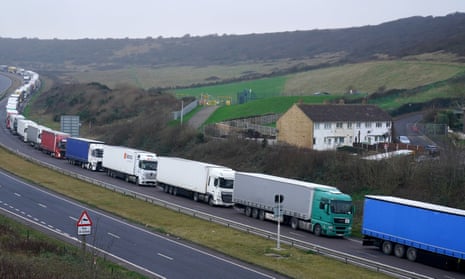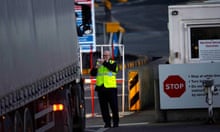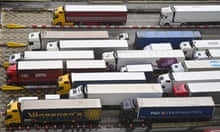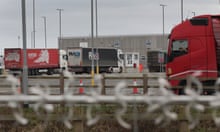Britain’s cost of living crisis is being made worse by Brexit dragging down the country’s growth potential and costing workers hundreds of pounds a year in lost pay, according to new research.
The Resolution Foundation thinktank and academics from the London School of Economics said the average worker in Britain was now on course to suffer more than £470 in lost pay each year by 2030 after rising living costs are taken into account, compared with what would have followed a remain vote in 2016.
In a report six years on from the referendum, the researchers said Brexit was damaging the competitiveness of UK exports on the world stage just as companies are forced to deal with the fallout from the coronavirus pandemic and Russia’s war in Ukraine pushing inflation to historic levels.
“A less open Britain is expected to be poorer and less productive,” it said.
Official figures on Wednesday showed a fresh rise in the inflation rate from 9% in April to 9.1% last month, as surging petrol prices and the rising cost of a weekly shop ramp up the pressure on struggling families. The Bank of England has warned that inflation could reach 11% by October.
As the government attempted to face down rail unions on Tuesday amid the biggest train strikes since the 1980s, ministers were forced to defend inflation-busting increases planned for the state pension while ordering pay restraint for workers in the public sector.
The former Conservative chancellor Ken Clarke said Britain was in the grip of the worst economic crisis since at least 1979, telling the BBC that a recession was almost inevitable. “We are, I think, almost certainly going to go into recession in the next couple of years,” he said. “The Bank of England has had to start tackling inflation, which has been allowed to get completely out of hand.”
Boris Johnson has warned workers against asking for bigger pay rises to prevent a 1970s-style “wage-price spiral” driving inflation higher, in sharp contrast to October last year, when the prime minister suggested Brexit could help create a high-wage, high-productivity economy of the future.
However, the report from the Resolution Foundation and LSE said Brexit would weigh heavily on productivity gains over the coming years up to 2030, while suggesting that higher import costs were adding to the pain for household finances.
The research estimated that labour productivity – a key measure of economic output per hour of work – would be reduced by 1.3% by 2030 because of a decline in openness of the British economy after Brexit, equivalent to losing a quarter of the efficiency gains achieved over the past decade.
Ministers have argued that bigger pay rises for UK workers would only be sustainable if backed by productivity gains. However, with the expected decline in the efficiency of the British economy after Brexit, the academics said inflation-adjusted pay was now set for a 1.8% fall by 2030. It said this was equivalent to the loss of £472 per worker per year.
The report’s authors included the LSE academic Swati Dhingra, an outspoken Brexit critic picked by the chancellor, Rishi Sunak, to sit on the Bank of England’s interest-rate setting monetary policy committee from August.
The report appeared to undermine the government’s argument that Brexit and its plans to level up the economy would boost prosperity outside London and the south-east, with researchers finding the north-east of England would be hardest hit by leaving the EU.
With a bigger industrial sector and higher exposure to the EU market, it said the region would see a 2.7% fall in manufacturing output by 2030 compared with a scenario in which the UK voted to remain in the EU in 2016.
Although the report found that exports to the EU had not been as heavily hit by Brexit under the terms of Johnson’s trade deal with Brussels since the start of last year, it warned that overall the UK would become less open and less competitive.
Exports to the EU are expected to be 38% lower than they would have been inside the EU by 2030, with a further 16% decline due to forgone further integration with the EU over that period.
Torsten Bell, chief executive of the Resolution Foundation, said Brexit would make recovering from the Covid pandemic and getting wages to rise sustainably after the cost of living crisis more difficult.
He said: “Ten per cent inflation is painful, whether you drive a train, commute by train, or have nothing to do with trains. It would always have been hard to cope with, but it is far more so for families coming on the back of 15 years of stagnant wages.
“The sustainable route out of this is stronger, productivity-led, wage growth. Covid-19 and Brexit don’t make that any easier to achieve, but the UK has considerable economic strengths and we urgently need a renewed economic strategy that builds on them.”
A government spokesperson said exports had increased in the three months to April and were above pre-pandemic levels. “Since we left the European Union, we have begun seizing new opportunities to improve UK regulation for businesses and consumers through plans to enhance competition and harness new technology.
“We will introduce the Brexit freedoms bill, which will enable the government to amend, repeal and replace retained EU law, helping us to create a new pro-growth framework that gives businesses the confidence to invest and create jobs.”










